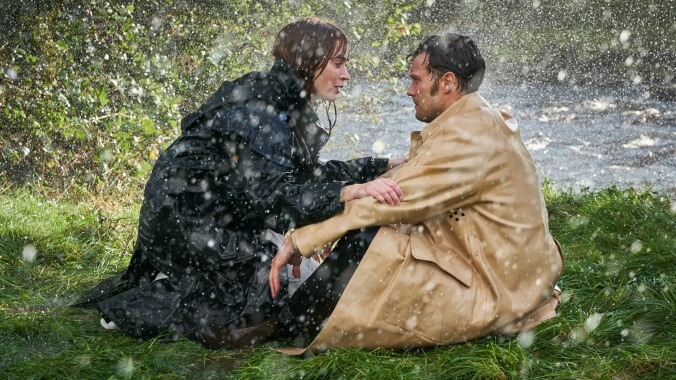2020 gets its Serenity with the epic “WTF?” of Wild Mountain Thyme


There are bad movies, and then there are the mystifyingly bad ones. These are the films that are stuck in the narrative equivalent of the uncanny valley, offering mostly workable stories with a handful of elements that render them strange in a primal, impossible-to-articulate way. It’s the same quality you find in scripts written by bots—the mangled gibberish that turns, say, a meal at Olive Garden into an exercise in surreal terror. Only a handful of films achieve this bizarre feat, always by accident. All a critic can do when faced with the risible plot twists of Serenity, The Book Of Henry, and now Wild Mountain Thyme is assume that the whole thing made more sense on the page.
To reveal what exactly makes Wild Mountain Thyme so memorably odd would be to spoil its climatic moment, which transforms the film from a knitted-together collection of bucolic Irish clichés—Guinness, stew, sick cows, runaway horses, drunken sing-alongs, stubborn grudges, even more stubborn redheads—into a work of unintentional surrealism more reminiscent of Quentin Dupieux than a decades-long romance set among the misty emerald hills of Éire. But the film is based on a play by John Patrick Shanley, and so the curious can read this brutal pan from a disgusted Irish Times critic that contemptuously gives away the twist in the last paragraph. It’s out there, all right, and after rewinding it twice in disbelief, this writer is pretty sure the surprise ending is meant literally.
But perhaps the most peculiar thing about this whole scenario is that Wild Mountain Thyme was written and directed by Shanley, who won an Oscar in 1988 for his screenplay for Moonstruck and was nominated again in 2008 for Doubt, which he also directed. The best parallel from his career, though, might actually be Joe Versus The Volcano (199o), a film that was dismissed by critics upon its release but has since been reclaimed as knowingly ridiculous, rather than inadvertently so. It’s far too early to say if this will be the case with Wild Mountain Thyme, but if Shanley’s trite version of Irish farm life is presented with tongue in cheek, it’s difficult to tell.
The sniggering begins in the opening moments of the film, when Christopher Walken, of all people, declares in an exaggerated brogue, “My name is Tony Reilly. I’m dead.” After a few more seconds of blather on the Irish love of storytelling (fiddle dee dee and tra la la to you too, Mr. Walken), we’re ricocheted back to sometime before old Tony shuffled off the mortal coil. He’s grousing to his son, also named Anthony (Jamie Dornan), about the dual gates that separate their property from that of the family’s next door. (If you suspected that those gates may be a guiding symbol throughout the film, you’d be right.) The elder Tony is a crotchety old coot who’s threatening to withhold his inheritance for no discernible reason other than that young Tony looks too much like his mother and is, as everyone keeps saying, a bit weird. In practice, this means he falls down a lot, talks to a donkey, and walks around the family farm with a metal detector, none of which make any more sense when his underlying issue is finally revealed.
Enter girl next door Rosemary (Emily Blunt), whose cheeks are ruddied to the point that she looks like she’s mid-contour at all times. Young Tony insists he’ll never get married, even though Rosemary, his childhood best friend, is smart, beautiful, and has a lovely singing voice, not to mention that he’s clearly in love with her. She loves him back, secretly, but their chemistry is less “will they or won’t they” than “good lord, get it over with.” Into this patience-testing dynamic strolls the obligatory American cousin, New York money manager Adam (Jon Hamm), to whom old Tony has offered to sell the family farm because, again, old Tony is kind of an asshole. (Shanley, it should be noted, is himself the American cousin and has relatives in rural Ireland.) Adam’s all-American worship of the almighty dollar proves distasteful to the simple country folk, however, and he quickly departs the story, only to return when something needs to happen already.
Wild Mountain Thyme only has one honest to goodness Irishman—that would be Dornan, who was born in Belfast—in its tiny core ensemble, and he caught the worst of it when the trailer for the film was mercilessly roasted on Irish social media upon its release last month. We’ll have to take their word on the accuracy of the accents (not good, apparently), but the characterizations, motivations, dialogue, and acting in this film are all so clumsy and baffling—at one point, Blunt stands up from a table but doesn’t straighten her back, instead shuffling forward like she’s contracted an instant case of kyphosis—that a bad regional inflection is just one sin among many.
In short, whatever it was that The New York Times saw in the play does not translate to the screen, although the cinematic version of the tale does allow for some very pretty landscape photography featuring stone cottages with charming red shutters and ancient gnarled trees perched atop pastures so green, they practically glow. (There’s also rain. Sheets and sheets of rain.) Take away the gorgeous setting, however, and you’re left with a romantic comedy that’s never romantic and only occasionally funny.
That is, until the film’s feverish final act, when Wild Mountain Thyme transforms from a movie you watch with one eyebrow raised into one that leaves your jaw on the floor. It’s a long road to get there, admittedly, and unless you’re the type of person who not only knows about but is eagerly looking forward to a Cats “butthole cut,” you might be better off waiting for the scene in question to be uploaded to YouTube. If you are one of those mischievous little devils who thrives on onscreen chaos, however, Wild Mountain Thyme is for you. Everyone else? Not so much.